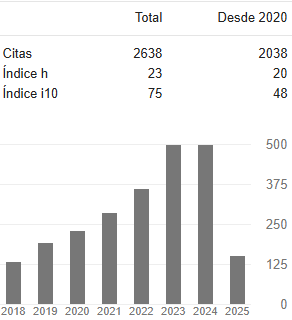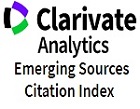Lineamientos para el diseño de Cursos Online Masivos y Abiertos (MOOC) en Ingeniería Electrónica
DOI:
https://doi.org/10.31908/19098367.3276Palabras clave:
Cursos Online Masivos y Abiertos, MOOC, aprendizaje electrónico, aprendizaje virtual, aprendizaje semipresencial, aula invertidaResumen
Los cursos online, masivos y abiertos (MOOC) son una nueva herramienta educativa que, en los últimos cinco años, han captado la atención de las más importantes instituciones educativas a nivel mundial. Sin embargo, hasta el momento no existen estudios concluyentes sobre el rol de esta herramienta en la educación superior. En este trabajo, se hace una revisión de la literatura científica sobre los MOOC, con el objetivo de identificar las tendencias y lineamientos para su creación. Si bien este estudio se enfoca al campo particular de la ingeniería electrónica, muchos resultados son aplicables a otros campos de la ingeniería y otras ramas del saber. La revisión realizada permite identificar las áreas en las que hay mayor potencial de impacto y visibilidad con la creación de los MOOC, así como los retos y estrategias para el diseño de sus contenidos.
Descargas
Referencias
J. M. Spector, «Remarks on MOOCS & mini-MOOCS,» Educational Technology Research and Development, vol. 62, nº 3, pp. 385-392, 2014.
L. Pappano, «The year of the MOOC,» The New York Times, 02 Nov 2012.
J. Haber, MOOCs, Cambridge: The MIT press, 2014.
J. Kay, P. Reimann, E. Diebold y B. Kumerfeld, «MOOCs: so many learners, so much potential...,» IEEE Intelligent systems, vol. 28, nº 3, pp. 70-77, 2013.
K. Pretz, «Ten technologies that could change the world by 2021,» IEEE The Institute, 12 Nov 2014.
J. Noonan y M. Coral, «Education, social interaction, and material co-presence: against virtual pedagogical reality,» Interchange, vol. 44, nº 1, pp. 31-43, 2013.
S. Haggard, «The maturing of the MOOC,» Department of business and innovation skills, 2013.
T. Liyanagunawardena, A. Adams y S. Williams, «MOOCs: a systematic study of the published literature 2008-2012,» The International Review of Research in Open and Distributed Learning, vol. 14, nº 3, pp. 202-227, 2013.
J. R. Young, «When professors print their own diplomas who needs universities,» Chronicles of higher education, vol. 55, nº 6, 2008.
D. H. Johnson, «Teaching a MOOC: experiences from the front line,» de IEEE Digital Signal Processing and Signal Processing Education Meeting, 2013.
F. Garcia, G. Diaz, M. Tawfik, S. Martin, E. Sancristobal y M. Castro, «A practice-based MOOC for learning electronics,» de Global Engineering Education Conference, 2014.
D. H. Johnson, P. Prandoni, P. C. Pinto y M. Vetterli, «Teaching signal processing online: a report from the trenches,» de IEEE International Conference on Acoustics, Speech and Signal Processing, 2013.
L. Stuchlikova y A. Kosa, «Massive Open Online Courses: challenges and solutions in engineering education,» de IEEE International Conference on Emerging eLearning Technologies and applications, 2013.
E. Rutz, «A MOOC with a business plan,» de ASEE Annual Conference and Exposition, 2014.
E. L. Burd, S. P. Smith y S. Reisman, «Exploring Business Models for MOOCs in Higher Education,» Innovative Higher Education, vol. 40, nº 1, pp. 37-49, 2015.
H. G. Sanchez, «Diseño de cursos virtuales: propuesta pedagógica fundamentada en un aprendizaje significativo,» Entre Ciencia e Ingeniería, vol. 3, nº 6, pp. 96-111, 2009.
W. Krauth, «Coming home from a MOOC,» Computing in Science Engineering, vol. 17, nº 2, pp. 91-95, 2015.
D. A. Bligh, What’s the use of lectures, Jossey-Bass publishers, 2000.
P. J. Guo, J. Kim y R. Rubin, «How video production affects student engagement: an empirical study of MOOC videos,» de ACM Conference on Learning @ Scale Conference, New York, 2014.
N. Mamgain, A. Sharma y P. Goyal, «Learner’s perspective on video-viewing features offered by MOOC providers: Coursera and edX,» de IEEE International Conference on MOOC, Innovation and Technology in Education, 2014.
B. D. Homer, L. P. Jan y L. Blake, «The effects of video on cognitive load and social presence in multimedia-learning,» Computers in Human Behavior, vol. 24, nº 3, pp. 786-797, 2008.
D. Diaz, R. Ramirez y D. Hernandez, «The effect of using a taking head in academic videos: an EEG study,» de IEEE International Conference on Advanced Learning Technologies, 2015.
A. M. F. Yousef, M. A. Chatti, U. Schroeder y M. Wosnitza, «What drives a successful MOOC? An empirical examination of criteria to assure design quality of MOOCs,» de IEEE international Conference on Advanced Learning Technologies, 2014.
T. Daradoumis, R. Bassi, F. Xhafa y S. Caballe, «A Review on Massive E-Learning MOOC Design, Delivery and Assessment,» de International Conference on P2P, Parallel, Grid, Cloud and Internet Computing 3PGCIC, 2013.
C. Willems, J. Jasper y C. Meinel, «Introducing hands-on experience to a Massive Open Online Course on openHPI,» de IEEE International Conference on Teaching, Assessment and Learning for Engineering, 2013.
A. Drummond, Y. Lu, S. Chaudhuri, C. Jermaine, J. Warren y S. Rixner, «Learning to Grade Student Programs in a Massive Open Online Course,» de IEEE International Conference on Data Mining, 2014.
B. Cheang, A. Kurnia, A. Lim y W.-C. Oon, «On automated grading of programming assignments in an academic institution,» Computers & Education, vol. 41, nº 2, pp. 121-131, 2003.
F. Al-Shamsi y A. Elnagar, «An intelligent assessment tool for student’s java submissions in introductory programming courses,» Journal of Intelligent learning systems and applications, vol. 4, nº 1, pp. 59-69, 2012.
T. Wang, X. Su, Y. Wang y P. Ma, «Semantic similarity-based grading of student programs,» Information and Software Technology, vol. 49, nº 2, pp. 99-107, 2007.
V. Potkonjak, M. Vukobratovic, K. Jovanovic y M. Medenica, «Virtual Mechatronic Robotic laboratory - A step further in distance learning,» Computers & Education, vol. 55, nº 2, pp. 465-475, 2010.
C. A. Jara, F. A. Candelas, S. T. Puente y F. Torres, «Hands-on experiences of undergraduate students in Automatics and Robotics using a virtual and remote laboratory,» Computers & Education, vol. 57, nº 4, pp. 2451-2461, 2011.
A. Rojko, D. Hercog y K. Jezernik, «Power Engineering and Motion Control Web Laboratory: Design, Implementation, and Evaluation of Mechatronics Course,» IEEE Transactions on Industrial Electronics, vol. 57, nº 10, pp. 3343-3354, 2010.
M. Tawfik, E. Sancristobal, S. Martin, R. Gil, G. Diaz, A. Colmenar, J. Peire, M. Castro, K. Nilsson, J. Zackrisson, L. Hakansson y I. Gustavsson, «Virtual Instrument Systems in Reality (VISIR) for Remote Wiring and Measurement of Electronic Circuits on Breadboard,» IEEE Transactions on Learning Technologies, vol. 6, nº 1, pp. 60-72, 2013.
Brinton, C., Chiang, M., Jain, S., Lam, H., Liu, Z., & Wong, F. (2014). «Learning about social learning in moocs: From statistical analysis to generative model» IEEE Transactions on Learning Technologies, vol. 7, no 4, pp. 346–359, 2014
C. Brinton, R. Rill, S. Ha, M. Chiang, R. Smith y W. Ju, «Individualization for Education at Scale: MIIC Design and Preliminary Evaluation,» IEEE Transactions on Learning Technologies, vol. 8, nº 1, pp. 136-148, 2015.
F. M. Hollands y D. Thirtali, «MOOCs: expectations and reality,» Columbia University, 2014.
L. Czerniewicz, A. Deacon, M. Fife, J. Small y S. Wajli, «CILT position paper: MOOCs,» University of Cape Town, 2015.
G. Hughes y C. Dobbins, «The utilization of data analysis techniques in predicting student performance in massive open onlie courses (MOOCs),» Research and Practice in Technology Enhanced Learning, vol. 10, nº 10, 2015.
G. S. Mason, T. R. Shuman y K. E. Cook, «Comparing the Effectiveness of an Inverted Classroom to a Traditional Classroom in an Upper-Division Engineering Course,» IEEE Transactions on Education, vol. 56, nº 4, pp. 430-435, 2013.
A. Ng y J. Widom, «Origins of the modern MOOC (xMOOC),» [En línea]. Available: http://www.andrewng.org/portfolio/origins-of-themodern- mooc-xmooc/. [Último acceso: 20 01 2014].
G. D. a. B. Ferri, «Distributed laboratories: Control system experiments with Lab VIEW and the LEGO NXT platform,» de ASEE Annual Conference and Exposition, 2012.
B. Ferri y J. Auerbach, «A portable finite state machine module experiment for in-class use in lecture-based course,» de ASEE Annual Conference and Exposition, 2012.
B. Ferri, D. M. Majerich, P. N. V y A. A. Ferri, «Use of MOOC to blend a linear circuits course for non majors,» de ASEE Annual Conference and Exposition, 2014.
L. E. Contreras, I. Escobar y J. A. Tristancho, «Estrategias educativas para el uso de las TIC en educación superior,» Tecnura, vol. 17, pp. 161-173, 2013.
E. Murcia, H. Córdoba, «Enseñar matemáticas usando objetos virtuales de aprendizaje en la Universidad Tecnológica de Pereira,» Entre Ciencia e Ingeniería, vol. 5, nº 10, pp. 148-162, 2011.
Descargas
Publicado
Número
Sección
Licencia
Derechos de autor 2019 Entre Ciencia e Ingeniería

Esta obra está bajo una licencia internacional Creative Commons Atribución-NoComercial 4.0.



















